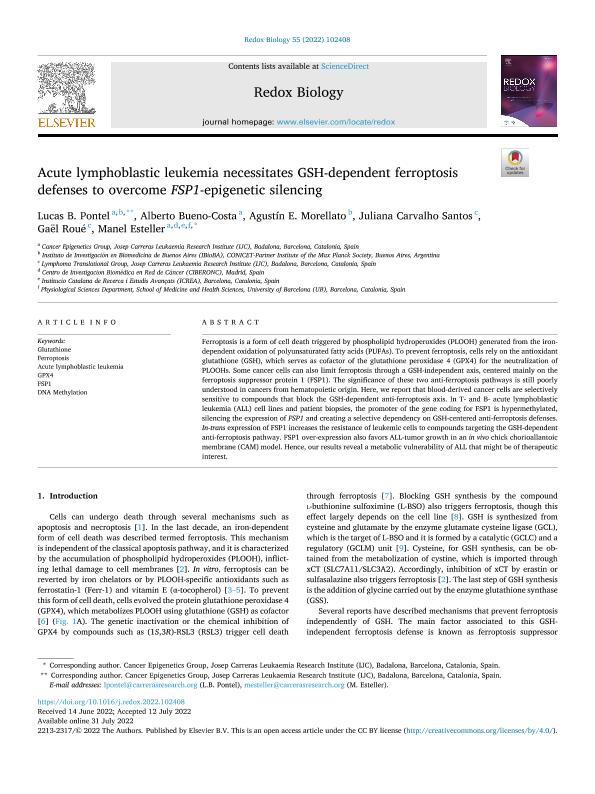Artículo
Acute lymphoblastic leukemia necessitates GSH-dependent ferroptosis defenses to overcome FSP1-epigenetic silencing
Pontel, Lucas Blas ; Bueno Costa, Alberto; Morellato, Agustín Ezequiel
; Bueno Costa, Alberto; Morellato, Agustín Ezequiel ; Carvalho Santos, Juliana; Roué, Gaël; Esteller, Manel
; Carvalho Santos, Juliana; Roué, Gaël; Esteller, Manel
 ; Bueno Costa, Alberto; Morellato, Agustín Ezequiel
; Bueno Costa, Alberto; Morellato, Agustín Ezequiel ; Carvalho Santos, Juliana; Roué, Gaël; Esteller, Manel
; Carvalho Santos, Juliana; Roué, Gaël; Esteller, Manel
Fecha de publicación:
09/2022
Editorial:
Elsevier
Revista:
Redox Biology
ISSN:
2213-2317
Idioma:
Inglés
Tipo de recurso:
Artículo publicado
Clasificación temática:
Resumen
Ferroptosis is a form of cell death triggered by phospholipid hydroperoxides (PLOOH) generated from the iron-dependent oxidation of polyunsaturated fatty acids (PUFAs). To prevent ferroptosis, cells rely on the antioxidant glutathione (GSH), which serves as cofactor of the glutathione peroxidase 4 (GPX4) for the neutralization of PLOOHs. Some cancer cells can also limit ferroptosis through a GSH-independent axis, centered mainly on the ferroptosis suppressor protein 1 (FSP1). The significance of these two anti-ferroptosis pathways is still poorly understood in cancers from hematopoietic origin. Here, we report that blood-derived cancer cells are selectively sensitive to compounds that block the GSH-dependent anti-ferroptosis axis. In T- and B- acute lymphoblastic leukemia (ALL) cell lines and patient biopsies, the promoter of the gene coding for FSP1 is hypermethylated, silencing the expression of FSP1 and creating a selective dependency on GSH-centered anti-ferroptosis defenses. In-trans expression of FSP1 increases the resistance of leukemic cells to compounds targeting the GSH-dependent anti-ferroptosis pathway. FSP1 over-expression also favors ALL-tumor growth in an in vivo chick chorioallantoic membrane (CAM) model. Hence, our results reveal a metabolic vulnerability of ALL that might be of therapeutic interest.
Palabras clave:
ACUTE LYMPHOBLASTIC LEUKEMIA
,
DNA METHYLATION
,
FERROPTOSIS
,
FSP1
,
GLUTATHIONE
,
GPX4
Archivos asociados
Licencia
Identificadores
Colecciones
Articulos(IBIOBA - MPSP)
Articulos de INST. D/INV.EN BIOMED.DE BS AS-CONICET-INST. PARTNER SOCIEDAD MAX PLANCK
Articulos de INST. D/INV.EN BIOMED.DE BS AS-CONICET-INST. PARTNER SOCIEDAD MAX PLANCK
Citación
Pontel, Lucas Blas; Bueno Costa, Alberto; Morellato, Agustín Ezequiel; Carvalho Santos, Juliana; Roué, Gaël; et al.; Acute lymphoblastic leukemia necessitates GSH-dependent ferroptosis defenses to overcome FSP1-epigenetic silencing; Elsevier; Redox Biology; 55; 9-2022; 1-11
Compartir
Altmétricas



